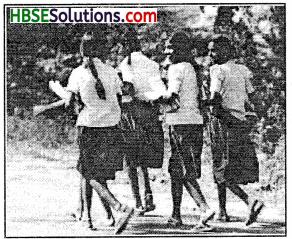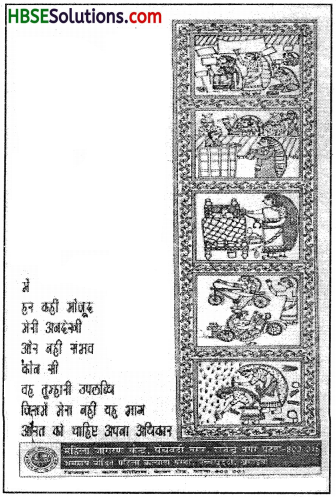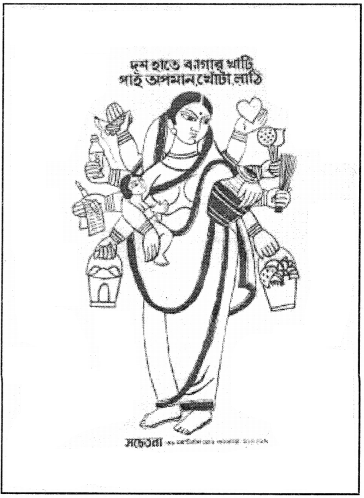Haryana State Board HBSE 7th Class Social Science Solutions Civics Chapter 4 Growing up as Boys and Girls Textbook Exercise Questions and Answers.
Haryana Board 7th Class Social Science Solutions Civics Chapter 4 Growing up as Boys and Girls
HBSE 7th Class Civics Growing up as Boys and Girls Textbook Questions and Answers
Growing up as Boys and Girls HBSE 7th Class Civics Question 1.
Are the statements given alongside true or false. Support your answer with the use of an example.
(a) All societies do not think similarly about the roles that boys and girls play.
(b) Our society does not make distinctions between boys and girls when they are growing up.
(c) Women who stay at home do not work.
(d) The work that women do is less valued than that of men.
Answer:
(a) True.
The way children grow in Madhya Pradesh and in Samoa is not same.
(b) False.
Girls are discriminated in day-to-day, life against boys.
(c) False.
They do most of the household chores which involve physical strengths.
(d) True
Although it is a negative aspect but it is prevalent in our society. We have a common notion that the household work women do is less paid for.
![]()
HBSE 7th Class Growing up as Boys and Girls Question 2.
Housework is invisible and unpaid work. Housework is physically demanding housework is time consuming. Write in your own words what is meant by the terms ‘invisible’, ‘physically demanding’, and ‘time consuming? Give one example of each based on household tasks undertaken by women in your home.
Answer:
‘Invisible’, here, means that the work done by women is devalued when it is not paid for because their physical and emotional stress is not recognized.
‘Physically demanding1 means that more labour is required to do household jobs than other work, technical or mechanical.
‘Time consuming1 means that household work requires a lot of time. Most-of her time is consumed in these activities and less time is left for herself or to relax.
Question 3.
If you have someone working k.s domestic help in your house or locality talk to her and find out a little bit more about her life. Who are her family members? Where is her home? How many hours does she work? How much is she paid? Write a small story based on these details.
Answer:
Yes, I know,Mr. Kanta Devi who is working as a domestic help in our locaiity. She does a lot of work-sweeping, cleaning, washing clothes, cooking food and looking after young children. Her family members living in jhuggi jhopari area near Yamuna river. She has two daughters and a son. She is a widow. She works at least 6 to 8 hours in a house where she is taking job. She gets very low salary approximate? 1,500 per month.
Question 4.
Make a list of toys and games that boys typically play and another of girls. List there is difference between these two lists. Can you think of some reasons why this is so? Does that have any relationship to the roles children have to play as adults?
Answer:
Toys and Games
| Boys | Girls |
| Cars, Gun, Bus, Bat, Animal toys, Business Games, Cricket, Football, Kabbadi, Basketball. | Dolls, Kitchen set, Cooking apparatus, Washing kit and House-warning, Doll wedding, Badminton, Hide and seek. |
These toys and games offered to boys and girls become a way of telling children that they will have different features when they become men
and women. This also reflects the difference in respect of physical strength and stamina alongwith influence of the society.
![]()
EXRCISE
Question 1.

The given picture relates to Samoan child in his school uniform. In what ways do the experience of Samoan children and teenagers differ from your own experiences of growing up? Is there anything in this experience that you wish was part of your growing up?
Answer:
| Somoan Children and Teenagers | Indian Children and Teenager |
| 1. Children did not go to school. (In the 1920s according to research report) | 1. Most of the children go to school. |
| 2. They learnt many things like (a) how to take care of children. (b) how , to do household work. | 2. They study and are generally not involved in household work. |
| 3. Young people learnt to take fishing expeditions. | 3. They learn the activities in school premises. |
Yes, I wish that we should be given experience of practical life alongwith the school activities.
Question 2.

Why do girls like to go to school together in groups?
Answer:
Girls like to go to school together in groups because:
(а) They have a fear of being teased or attacked if they walk alone.
(б) They feel more secure and safe if they walk in groups.
Question 3.
Were Harmeet and Shonali correct in saying that Harmeet’s mother did not work?
Answer:
Harmeet and Shonali are not correct in saying that Harmeet’s mother did not work because
(a) She is a housewife and the household work is a full-day job.
(b) Her work is taxing and time-consuming.
(c) If she does not work, everything in the house will be in chaos.
Question 4.
What do you think would happen if your mother or those involved in doing the work at home went on a strike for a day?
Answer:
If my mother or those involved in doing work at home went on a strike for a day, the whole house would turn into a chaos. The men of the house would’nt be able to manage it.
Question 5.
Why do you think that men and boys generally do not do house work? Do you think they should?
Answer:
Men and boys generally do not do house work because:
(a) In our society, it is believed that household work is the respohsibility of women of the house.
(b) They are brought up like that and are not given training of any household work from the beginning.
Yes, I think they should also do household because:
(i) In case, women go out to work, they can manage house
(ii) Household work is a joint responsibility.
![]()
Question 6.
Below is some data from a special study done by the central statistical organization of India (1998-99).
| State | Women Paid (Work hours per week) | Women Unpaid (Housework hours per week) | Women (Total) | Men Paid (Work hours per week) | Men Unpaid (Housework hours per week) | Men (Total) |
| Haryana | 23 | 30 | ? | 38 | 2 | ? |
| Tamil Nadu | 19 | 35 | ? | 40 | 4 | ? |
Study the table given above and answer the related questions.
(а) What are the total number of work hours spent by women in Haryana and Tamil Nadu each week?
Answer:
Total number of work hours spent by women in Haryana is 53 and in Tamil Nadu 44 in a week.
(b) How does this compare with the total number of work hours spent by men?
Answer:
The number of workhours spent by men in Haryana are 40 and in Tamil Nadu 44 in a week.
In Haryana women spend more hours on work than men.
Men spend only 5 percent of their total hours of work in household.
Question 7.
What do you think this poster is trying to say?

Answer:
This poster is trying to highlight the importance of women in household and in the lives of men. The women should also be given their place of dignity and equality in society.
Question 8.
This poster was created by ^omen’s groups in Bengal. Can you write an interesting slogan for the poster?

Answer:
Women the Divine Power.
![]()
HBSE 7th Class Civics Growing up as Boys and Girls Important Questions and Answers
Very Short Answer Type Questions
Question 1.
Where are the Samoan Island situated?
Answer:
The Samoan Islands are situated in the Southern Pacific Ocean.
Question 2.
What are the main work of Samoan people?
Answer:
The main work of the Samoan people are fishing and planting coconuts.
Question 3.
How do societies make distinction between boys and girls in their early age?
Answer:
The boys and girls are given different toys such as car and doll to play with in their young age.
Question 4.
To whom the main responsibility for housework is given?
Answer:
The main responsibility for housework is given to women.
Question 5.
Who is Mangala?
Answer:
Mangala is a domestic helper in the house of Harmeet.
Short Answer Type Questions
Question 1.
Write a brief note on the life of Samon Children.
Answer:
(i) The Samoan children did not go to school.
(ii) They learnt to take care of children and do house work.
(iii) They learnt to undertake fishing.
Question 2.
For what purpose the boys did use the street?
Answer:
The boys used the street as a place to stand around idling, to play, to try out tricks with their bicycles.
Question 3.
Did Shalini not work all the day and not deserve to be treated with some respect?
Answer:
(i) Shalini worked all the day starting from five in the morning till late in the night.
(ii) She deserved to be treated with some respect.
![]()
Question 4.
What has the Government done for girls to attend school and the women to work outside the home?
Answer:
The Government has setup ‘anganwadis’ or childcare centre by passing laws to provide creche facilities.
(a) Creche is a day nursery for children when their parents are at work.
(b) Thus, the provision of creches helps women to work outside the home. It also provide opportunity to more girls to attend school.
Long Answer Type Questions
Question 1.
What tasks does the housework involve in rural and urban areas?
Answer:
The housework involves the following tasks:
In rural areas women and girls carry heavy loads of firewood. They wash cloths and dishes, sweep and clean floors. They also pick up loads which require bending, lifting and carrying. They also cook food by standing for long hours in front of hot stoves both in rural and urban areas. They take care of children, old and sick people at home.
Question 2.
What did Shalini say about her experience of working in Delhi?
Answer:
(i) Shalini said that her Memsahib always shouted to get work done.
(ii) I started my work at 5 o’clock in the kitchen.
(iii) I was given a cup of tea and two dry rotis and never could get third roti in the breakfast.
(iv) I took an extra roti secretly in the evening.
(v) I could not wear chappals in the house. As a result, my feet would swell up in the winter.
Growing up as Boys and Girls Class 7 HBSE Notes
- Care-giving: Care-giving refers to a range of tasks related to looking after and nurturing. Besides physicate looks, they also involve a strong emotional aspect.
- Devalued: When someone is not given due recognition for a task or a job they have done, they can feel devalued.
- Double Burden: Literally means double load. This term is commonly used to describe the women’s work situation. It has emerged from a recognition that women typically labour both inside the house and outside.
- Identity: Identity is a sense of self-awareness of who one is.